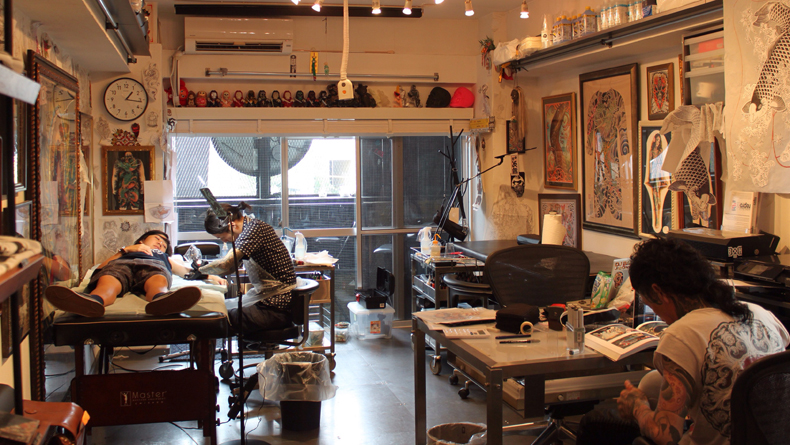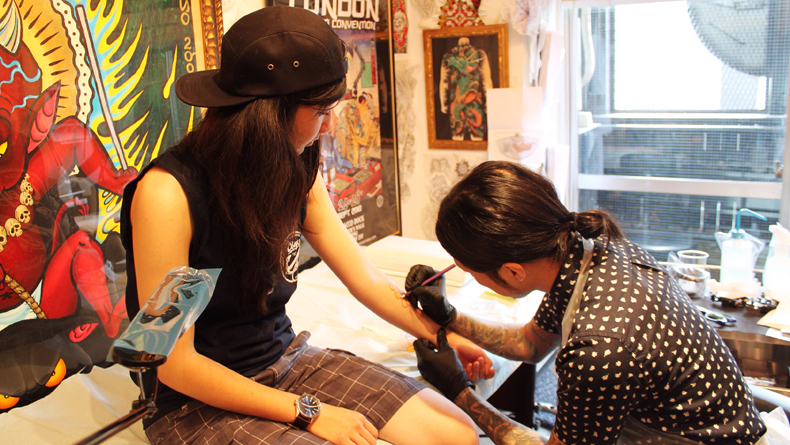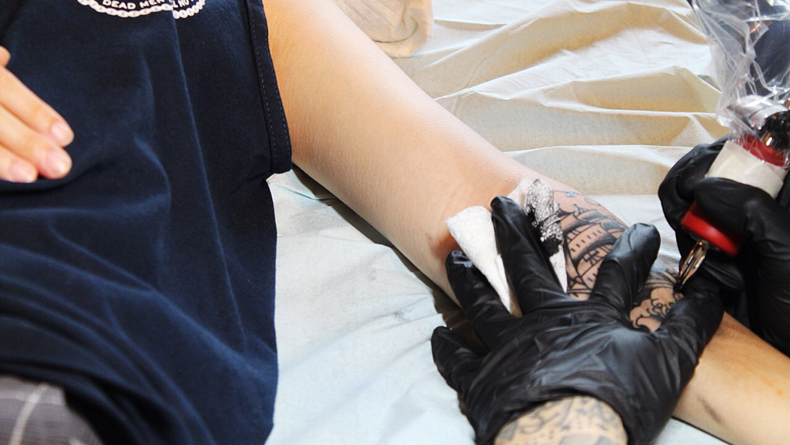Three Tides Tattoo, Jingumae
Tokyo may be notorious for its loud fashion and otaku culture, ranging from anime and manga enthusiasts to reki-jo (female history connoisseurs), but many locals still share a disdain for something the West has increasingly grown to accept—tattoos. Though tattoos have a long history in Japan as a form of decoration, they also have a more recent history involving the nation’s criminals. Three Tides Tattoo Tokyo, sister shop to an Osaka location, is slowly trailblazing through this stigma.
Within walking distance from Stussy and Billionaire Boys Club, brands that have gained worldwide recognition for their boutique treatments of street subculture and fashion, Three Tides is nothing like the seedy tattoo shops you may be familiar with. Recently, I had the pleasure of observing artist Mitomo Horihiro (also known as Hiroshi Hirakawa) tattoo an overseas client.
On a Monday afternoon, we walked into the tattoo shop on the second floor of a quiet building. If you are unfamiliar with the Jingumae area, GPS will serve as a godsend when searching for this hideaway. The shop is only large enough for two clients at a time. The tattoo seats, lined with clean paper, are reminiscent of the examination beds in a doctor’s office. The walls are filled with sketches and framed artwork—styles ranging from traditional Japanese art to Hello Kitty—and the upper shelves are smartly decorated with the shop’s equipment. A jazzy number by Ringo Sheena was playing in the background as two artists, Hiroshi and Ganji, greeted us from their modern work desk. The shop had just opened for the day, but the two were already busy with custom designs, phone calls, and e-mails. Throughout the session, the two were quiet but answered our questions promptly and kindly.
Hiroshi, a sharply dressed young man, made a few necessary adjustments to the client’s design—a ship—and began to set up his station. We watched him clean his tools, carefully examine a fresh needle with a monocle, and pour black ink into tiny caps. Such precision reminded me of a scientist in a laboratory. He cleaned his own hands before gently shaving and washing the client’s forearm. Once she confirmed the location of the tattoo with a mirror check, he began to work. Ganji didn’t have an appointment at the time, but kept busy by sketching on a skull head. In less than two hours, the sound of the tattoo gun ceased and Hiroshi calmly announced that the tattoo was finished. A black and gray ship with clean lines and playful waves adorned the client’s arm.
The kobushi, or fist-sized tattoo, cost ¥34,000 (¥30,000 for the tattoo plus a ¥4,000 service fee). The same sized tattoo in the United States would cost a lot less. When asked why the client chose Three Tides over any place in America for her first tattoo, she replied, “Businesses in Japan in general are more thorough with their work and they always take pride in their work no matter how small.” Afterwards, she commented, “I felt like I was in safe hands. Hiroshi was very meticulous in his set-up. There was an art to it. If I get a tattoo again, I will definitely come back here.”
Walk-ins are possible—a few clients were able to set something up while we were there—but the artists’ schedules are usually packed. They also alternate between the Tokyo and Osaka locations. Appointments are a must if you like the work of a specific artist. Three Tides charges by the size of the tattoo, with coin sized ink starting at ¥10,000, cigarette pack sized at ¥20,000, postcard sized at ¥50,000, and upwards from there. If you can make the trip, it is worth it to meet for a consultation to discuss exactly what you want (deposits are ¥10,500). The shop offers books, drawings, and previous work for clients to view. This is especially important if you are unsure of your Japanese ability. The artists speak some English—their work is internationally renowned and demanded by tattoo addicts across the globe—but Mika, the store manager, is your best bet for handling those finer details. If it is not possible for you to meet in person prior to your appointment, e-mail consultations can be arranged.
Though it is unlikely that tattoos will be considered art in the minds of conservatives anytime soon—in Japan especially—the artists at Three Tides remain committed to their work. They simply want tattoos to be acknowledged as a form of beauty, not of mere social deviance, even if you would never get one yourself. Those who do not know much about the tattoo world will assume that all tattoos are the same—equally bad, as big of a mistake as the next. But here’s some perspective. There’s cheap alcohol and then there’s mixology. Similarly, there are tattoo shops and then there’s Three Tides.
The Deets
Address: #201, 3-15-8 Jingumae Shibuya-ku, Tokyo
Tel: 03-6804-1189
Open: Thu-Tue, 12-8 p.m.
















Leave a Reply